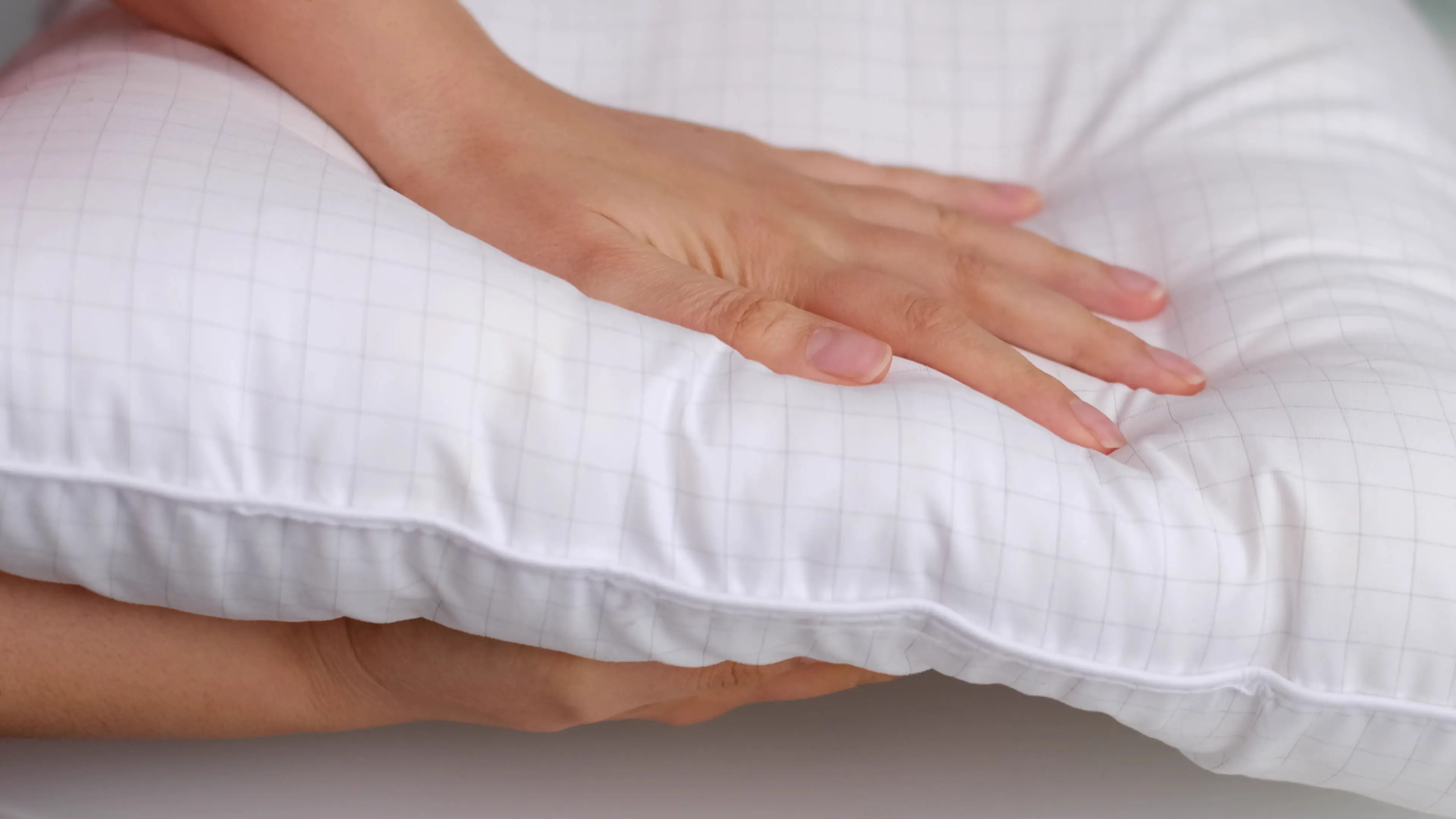The level of firmness, softness, flexibility, and ability to support the pressure points of a pillow can greatly impact your comfort and the quality of your sleep. Try to choose the best pillow that is neither too firm nor too soft for your preferred sleeping style, as using the wrong pillow can result in discomfort and reduce the overall quality of your sleep.
Ideally, you should look for a pillow that offers consistent support to prevent stiffness in the neck and shoulders, whether it be a neck pain pillow, a pregnancy pillow, an orthopedic pillow, or a cooling pillow.
Why is pillow firmness important?
The level of firmness, softness, flexibility, and ability to support the pressure points of a pillow without sinking can impact your sleep quality. It is important to choose a pillow that is neither too firm nor too soft for your chosen sleeping position.
Using the incorrect pillow can result in discomfort and reduce the general quantity and quality of your sleep.
Firmness vs. Loft
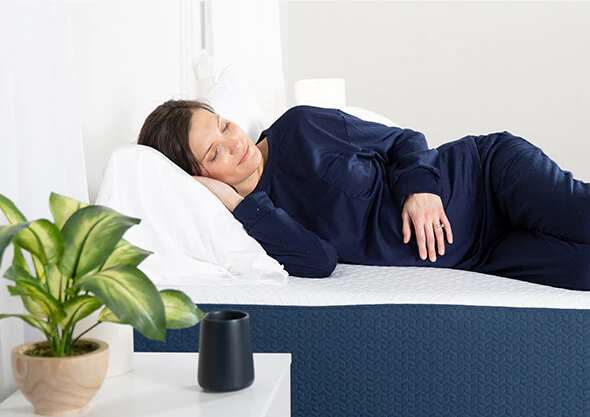
When talking about the loft of a pillow, it refers to its height or thickness, while firmness refers to how much your pillow resists compression when lying on it and maintaining its shape. Both of these factors are crucial in providing support to your neck and spine, ultimately impacting your sleeping position.
Pillows with low lofts have a flat profile and offer minimal support. These types of pillows are ideal for individuals who sleep on their backs, as they help keep the head and neck in a natural, straight alignment. On the other hand, pillows with a high loft provide more substantial cushioning and are beneficial for side sleepers. They are designed to cradle the head and neck, mimicking the natural curves of the cervical spine.
The Pillow Firmness Scale
Although there isn't a standard scale or a pillow firmness chart for measuring pillow hardness, we advise gauging firmness using levels of "give." A cushion is softer the more give it has when weight is applied. A pillow is on the harder end of the range if it has little give and sinks quickly when weight is applied.
What’s the difference between soft and firm pillows?
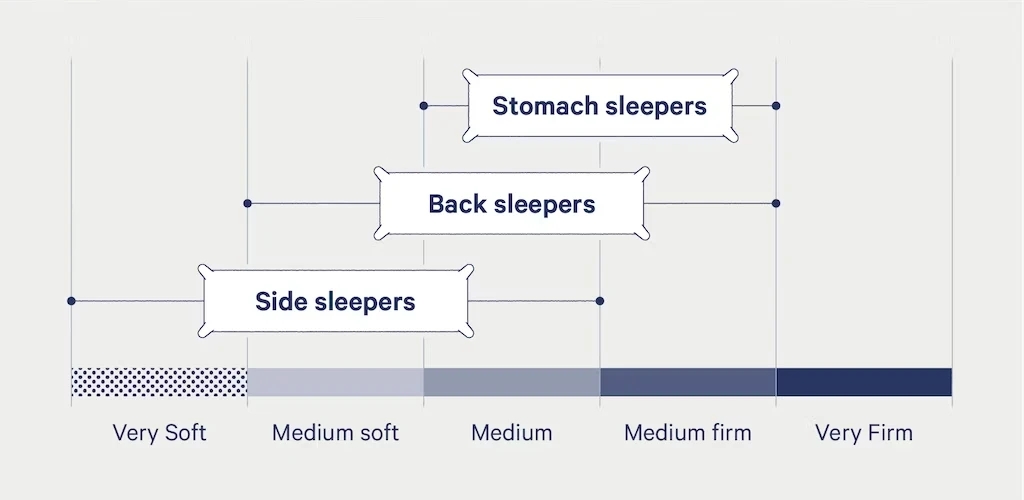
The main difference between firm and soft pillows lies in their feel and how they react to pressure. A firm pillow keeps your head and neck comfortably elevated. This can be ideal for side sleepers, as it helps maintain a neutral spine position.
On the other hand, a soft pillow is like a fluffy cloud, cradling your head and neck in a conforming embrace. It sinks in under your weight, molding itself to your curves. This can be heaven for stomach sleepers, who prefer a thinner, softer cushion to avoid straining their spines.
Pros of a firm pillow
- Spinal Alignment: Firm pillows give sturdy, stable support for your head, which may prevent your neck from shifting excessively as you sleep and promote correct spinal alignment.
- Durable: Thanks to their firmness, firm pillows retain their shape and keep their support and loft for longer periods.
Cons of a firm pillow
- Pillows Might Cause Neck and Back Pain: A pillow that is excessively firm for your tastes and sleep position is unlikely to be comfortable to sleep on. It may also feel too firm to give proper pressure relief, which might result in long-term neck or back pain.
- More Expensive: Firmer pillows are usually more pricey than softer pillows, so if you are on a tight budget, keep in mind that firmer pillows will cost you more.
Pros of a soft pillow
- More Comfort: Provides modest and steady pressure relief as you sleep. Furthermore, soft pillows immediately conform to your body's contours, providing a luxurious surface regardless of your sleeping position.
- Often more affordable: Softer pillows are more affordable than other types of pillows. So if it is the pillow of your choice, you will get quality and pressure relief at a cheaper price.
Cons of a soft pillow
- Might Be Uneven: Soft pillows are more likely to become lumpy. Soft foam and latex pillows do not face the same issues and do not develop lumps; however, all foam and latex pillows, soft and firm, might show wear and tear over time.
- Can lead to head misalignment: With wear over time, soft pillows can deflate and therefore offer no proper neck support, which can lead to spinal misalignment.
Medium-firm pillows
A medium-firm pillow sits between the softest and firmest options, leaning slightly towards the firmer side. Allowing it to deliver exceptional comfort and support in one.
These pillows offer just enough firmness to properly cradle your head and neck, maintaining proper spinal alignment while also offering a slight plush feel.
Therefore, medium-firm pillows are considered versatile, catering to a wide range of sleepers and preferences, including back, side, and even stomach sleepers in some cases.
Pillow Firmness And Material
If you want to know more about pillow types, you can always check out our pillow types guide.
Latex
Latex is a natural substance made from rubber tree sap, and when used as a memory foam, it provides head and neck support. The difference is that latex pillows are more consistent and require less fluffing or shaking.
Down
Down pillows include geese or duck plumage, but not feathers, and they are a common choice for back, stomach, and even side sleepers because of how plush and soft they are. Down pillows also promote airflow and breathability more than foam-based materials.
Memory foam
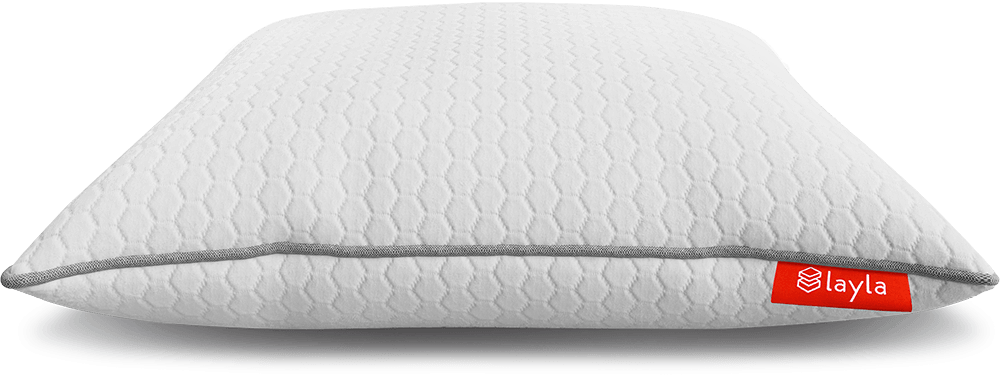
Memory foam, often called viscoelastic polyurethane foam, is known for taking shape and conforming to the body of the sleeper. Memory foam is a firm material that keeps the sleeper supported and promotes spinal alignment.
Feather

Feather pillows are stuffed with goose or duck feathers. They are not to be confused with down pillows, which are mostly composed of feathers. Because of their durability and plushness, feather pillows are popular with many sleepers.
Additionally, they are typically less expensive than down pillows. Since down and feather pillows are softer than many synthetic fibers or foam pillows, they fit the body more naturally, relieving pressure on the shoulders and neck muscles and promoting better sleep and general wellness.
Best Pillow Firmness for Your Sleep Position
Pillow firmness for stomach sleepers
If you prefer sleeping on your stomach, it is recommended to choose a pillow with a low loft and a soft texture. This type of pillow will offer minimal resistance and keep your neck in a position that is almost parallel to the rest of your back. Stomach sleepers should opt for thinner and softer cushions to avoid elevating their heads too much, which can cause strain on the spine. For additional tips on improving your comfort during sleep, please refer to our helpful guide.
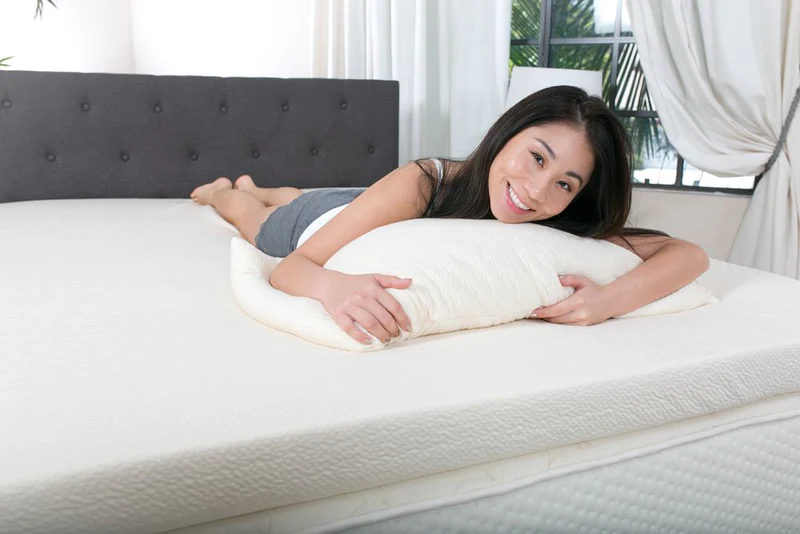
Best pillow firmness for combination sleepers
Combination sleepers tend to occupy a variety of postures while asleep. A medium-firm, adaptable pillow, as it takes your shape and hugs you in, is most suited to adapting to various sleeping postures.
Combination sleepers alternate positions during the night, making pillow-choosing difficult. We recommend trying a medium-firm pillow that is flexible and rapidly adjusts to your various sleeping positions.
Best pillow firmness for side sleepers
Side sleepers require a firmer pillow with a medium loft to support their cervical spine while resting. Pillows that are excessively thick or too thin will alter the normal curvature of the neck, resulting in cramps over time.
Side sleepers require a pillow that is thick enough to maintain spinal alignment. Pillows ranging in height from medium to high will help to elevate your neck. That’s why side sleepers should select one that maintains the spine's natural curvature.

Pillow firmness for back sleepers
While they may move positions sometimes throughout the night, back sleepers spend most of their time sleeping on their backs. Medium-firm pillows provide the finest support for back sleepers of all types.
Back sleepers frequently require just enough head and neck support to sleep comfortably. Lower- to medium-height pillows help support the neck without pushing it too far forward.

Choosing a suitable pillow firmness
- Your sleeping position: Depending on your preferred sleeping style and position, you can choose a suitable pillow. As for stomach and back sleepers, pillows with low heights will offer the right neck support to avoid neck strains. Side sleepers, on the other hand, might prefer softer pillows for pressure relief.
- Personal preference: Some sleepers prefer plushier, softer pillows for pressure relief, while others prefer firmer pillows that ensure correct spinal flow and promote sleep free from misalignment. It all depends on which pillow you prefer.
- Distance between neck and shoulder: Filling the gap between the neck and the shoulder if you are a side sleeper or a back sleeper is essential to ensuring a healthy sleep that causes no strains. So, look for a new pillow that can ensure proper spinal alignment.
FAQs
Is a soft or firm pillow ideal for back sleepers?
The best pillow firmness would be a medium-firm pillow, as it will offer optimum support, comfort, and spinal alignment.
What is the best pillow for babies?
To prevent any skin irritations, stick to memory foam or synthetic fiber filling. To ensure that your baby has enough support, the pillow should be the right size to allow for their growth. It shouldn't be too soft or too hard.
What is the best pillow for neck pain? A firm or soft pillow for neck pain?
The answer is that the pillow firmness for neck pain varies from one person to another. While some individuals believe that a soft cushion is more pleasant, others find that a firm pillow offers the support they want to lessen their neck ache. It's essential to try out many pillows before settling on the one that suits you the best.
How do you know if a pillow is too firm?
A firm pillow won't sink your head and neck as far into the material as a soft pillow will. Additionally, a firm pillow might not be a supportive pillow and might cause you to have a restless night cause shoulder or stiff neck pain, and may result in improper spinal alignment.
Conclusion
The firmness, softness, flexibility, and ability to relieve pressure points of a pillow can have a significant impact on your comfort and the quality of your sleep. Using the wrong pillow can lead to discomfort. It is ideal to find a pillow that provides consistent support so it can enhance your sleep experience, whether it is a latex pillow, cooling pillow, down pillow, organic pillow, or any pillow type.
Jessica H.
Jessica is a reviewer, writer, and sleep enthusiast at Sleepiverse. Jessica graduated with her master's degree in Nursing research and education. She is a registered nurse and currently works in the Intensive Care Unit. Since becoming a nurse, Jessica has worked the night shift, which means a disrupted sleep schedule. Knowing she needed to function at her best while caring for patients at night, she spent a lot of time researching how to sleep well with a difficult schedule.


